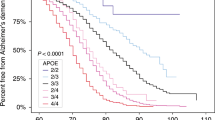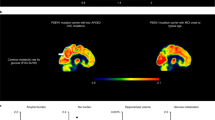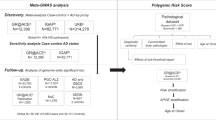Abstract
Amyloid β-protein (AP) is a peptide of relative molecular mass (Mr) 42,000 found in the senile plaques, cerebrovascular amyloid deposits, and neurofibrillary tangles of patients with Alzheimer's disease and Down's syndrome (trisomy 21)1–4. Recen t molecular genetic evidence has indicated that AP is encoded as part of a larger protein by a gene on chromosome 21 (refs 5–7). The defect in the inherited autosomal dominant form of Alzheimer's disease, familial Alzheimer's disease (FAD), has been mapped to the same approximate region of chromosome 21 by genetic linkage to anonymous DNA markers8, raising the possibility that this gene product, which could be important in the pathogenesis of Alzheimer's disease, is also the site of the inherited defect in FAD (ref. 5). We have determined the pattern of segregation of the AP gene in FAD pedigrees using restriction fragment length polymorphisms. The detection of several recombination events with FAD suggests that the AP gene is not the site of the inherited defect underlying this disorder.
This is a preview of subscription content, access via your institution
Access options
Subscribe to this journal
Receive 51 print issues and online access
$199.00 per year
only $3.90 per issue
Buy this article
- Purchase on Springer Link
- Instant access to full article PDF
Prices may be subject to local taxes which are calculated during checkout
Similar content being viewed by others
References
Glenner, G. G. & Wong, C. W. Biochem. biophys. Res. Commun. 122, 1131–1135 (1984).
Kidd, M., Allsop, D. & Landon, M. Lancet i, 278 (1985).
Masters, C. L. et al. EMBO J. 4, 2757–2763 (1985).
Masters, C. L. et al. Proc. natn. Acad. Sci. U.S.A. 82, 4245–4249 (1985).
Tanzi, R. E. et al. Science 235, 880–885 (1987).
Kang, J. et al. Nature 325, 733–736 (1987).
Goldgaber, D. et al. Science 235, 877–879 (1987).
St. George-Hyslop, P. H. et al. Science 235, 885–890 (1987).
Hodge, S. E., Morton, L. A., Tidemam, S., Kidd, K. K. & Spence, M. A. Am. J. hum. Genet. 31, 761–762 (1979).
Lathrop, G. M., Lalouel, J. M., Julier, C. & Ott, J. Proc. natn. Acad. Sci. U.S.A. 81, 3443–3446 (1984).
Lathrop, G. M. & Lalouel, J. M. Am. J. hum. Genet. 36, 460–465 (1984).
Lathrop, G. M., Lalouel, J. M., Julier, C., & Ott, J. Am. J. hum. Genet. 37, 482–499 (1985).
Monaco, A. P. et al. Nature 323, 646–650 (1986).
Tanzi, R. E. et al. Cytogenet. Cell Genet. 40, 760 (1985).
Delabar, J. et al. Science 235, 1390–1392 (1987).
St. George-Hyslop, P. H. et al. Science (in the press).
Author information
Authors and Affiliations
Rights and permissions
About this article
Cite this article
Tanzi, R., George-Hyslop, P., Haines, J. et al. The genetic defect in familial Alzheimer's disease is not tightly linked to the amyloid β-protein gene. Nature 329, 156–157 (1987). https://doi.org/10.1038/329156a0
Received:
Accepted:
Issue Date:
DOI: https://doi.org/10.1038/329156a0
This article is cited by
-
The Ubiquitin-Proteasome System and Molecular Chaperone Deregulation in Alzheimer’s Disease
Molecular Neurobiology (2016)
-
The role of β-amyloid peptide in alzheimer's disease
Metabolic Brain Disease (1994)
Comments
By submitting a comment you agree to abide by our Terms and Community Guidelines. If you find something abusive or that does not comply with our terms or guidelines please flag it as inappropriate.



